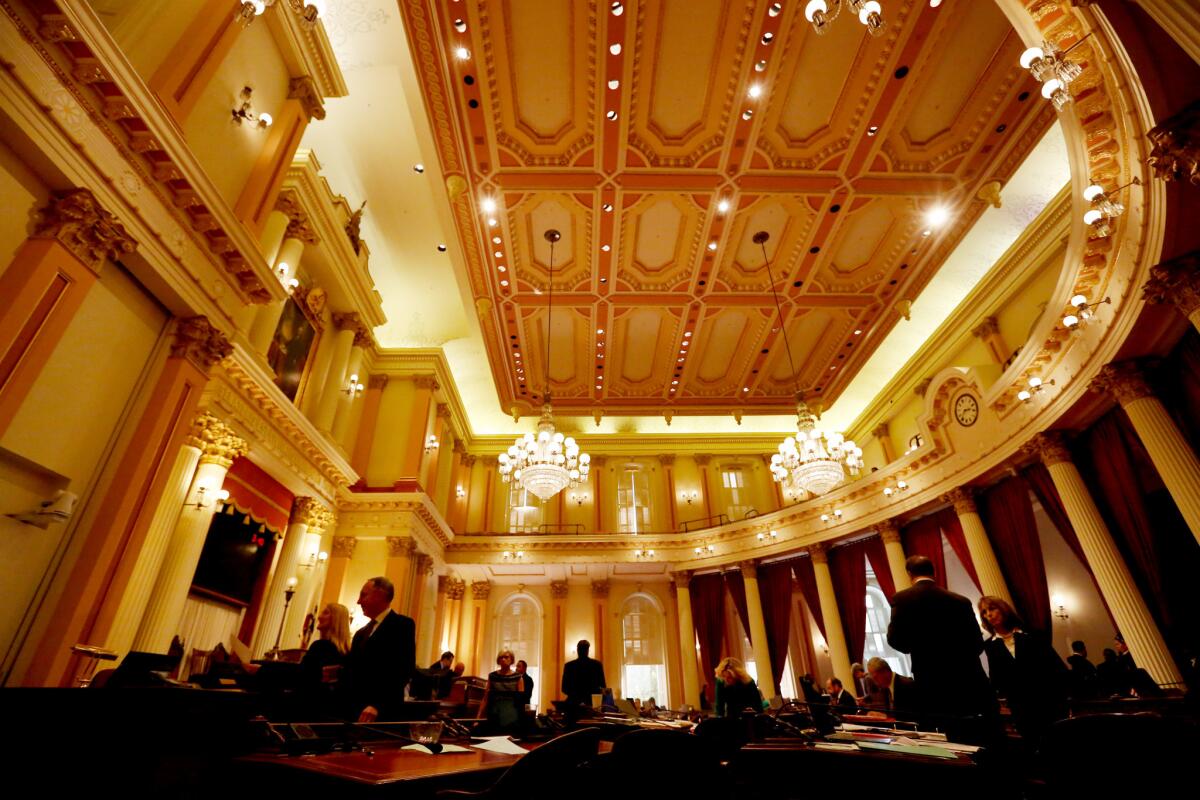California lawmakers shelve dozens of bills, including measures keeping bars open later and limiting gun purchases

Reporting from Sacramento — State lawmakers gutted or shelved dozens of bills for the year on Friday, including proposals to allow bars to stay open later, examine police practices, regulate marijuana and prohibit Californians from buying more than one rifle a month.
Friday was the deadline for the Senate’s and Assembly’s appropriations committees to pare down the list of bills to be acted on this year, ostensibly rejecting those without sufficient support or that cost too much.
The process, which places legislation on what the committees call a “suspense file,” nabbed nearly 500 bills for additional review — based on whether they were projected to spend $150,000 or more of taxpayer funds in the coming fiscal year.
In truth, the process allows lawmakers to privately wrestle with both the policy and politics of the bills in question. On Friday, 128 bills were killed with little or no explanation.
One proposal rejected, Senate Bill 384, would have allowed cities the option of letting bars extend their hours of operation until 4 a.m. Instead, the bill was revised to create a task force for studying the issue of keeping bars open beyond 2 a.m., with a report due back to the Legislature by the end of 2019.
The legislation had a long list of opponents, who argued that the extended serving hours would only push the problems with alcohol consumption further into the predawn hours.
SB 384’s author, Sen. Scott Wiener (D-San Francisco), criticized the gutting of the bill.
“There’s nothing radical about letting local communities decide for themselves whether to let their bars and nightclubs go later,” he said. “It’s embarrassing that California shuts down its nightlife so early. We’re not going to give up.”
A bill killed amid concerns about its high cost would have required law enforcement agencies in California to disclose all of their surveillance equipment to the public.
Under the legislation by state Sen. Jerry Hill (D-San Mateo), police and sheriff’s departments would have had to submit a plan to local officials — and present it at an open hearing — on what surveillance technology they employ and how.
The bill was predicated on two laws that went into effect last year. One of those requires agencies to draft and publicly post privacy and usage policies for surveillance devices often called “stingrays” or “dirtboxes.” Stingrays imitate the function of a cell tower and capture nearby phone signals, allowing law enforcement officers access to messages, conversations and call logs.
The fiscal committee found the state Justice Department would have faced significant costs to hire more people to assist with online investigations, data collection and reporting surveillance use policies throughout the state.
The Senate panel also shelved a measure that would that would have funded a study by state Atty. Gen. Xavier Becerra of police shootings across California.
The measure, Assembly Bill 284 from Assemblyman Kevin McCarty (D-Sacramento), would have authorized Becerra to examine the circumstances, policies, training and oversight involved in police shootings that resulted in death or serious injuries between 2015 and 2016 for a report to be issued by July 2019. But a committee analysis of the bill said the study would have cost $5.4 million.
Ten bills aimed at regulating marijuana were placed on hold for the year Friday, giving California’s new Bureau of Cannabis Control time to finish its own rules before lawmakers pile on with additional restrictions.
The bills, which were held by the Senate Appropriations Committee without comment, would have further regulated where pot can be used, how marijuana is marketed, the trademarking of products and would have required the state to produce a consumer guide for buying cannabis.
“Legislative leaders are working with the administration on a budget trailer bill to resolve cannabis-related issues. It makes sense to take a comprehensive approach,” said Sen. Ricardo Lara (D-Bell Gardens), chairman of the committee.
The National Rifle Assn. won a rare victory in the California Legislature when the Assembly panel gutted key portions of a bill that would have prohibited buying more than one rifle in any 30-day period.
State law already bans buying more than one handgun a month, but Sen. Anthony Portantino (D-La Cañada-Flintridge) introduced the measure to also include long guns in that limit, which was opposed by groups including the NRA and the Firearms Policy Coalition.
“This is an important win for current and future gun owners,” Craig DeLuz, spokesman for the coalition, said in a written statement. “The rationing of civil rights should never be tolerated.”
The Assembly panel also sidelined a bill that would have ended lifetime listing of many convicted sex offenders on a public registry after officials said it could cost tens of millions of dollars to make the change.
Wiener and Los Angeles County Dist. Atty. Jackie Lacey had proposed that the names of those who committed lower-level, nonviolent sex crimes, or who are judged to be low risks to re-offend, be removed from the registry after 10 or 20 years.
Lawmakers also halted a proposal that would increase environmental scrutiny of a groundwater pumping project in the Mojave Desert, another chapter in a long-running controversy over whether Cadiz Inc., a Los Angeles company, will be allowed to take water from under the desert and sell it to Southern California cities.
U.S. Sen. Dianne Feinstein (D-San Francisco) and Gov. Jerry Brown have expressed concern about Cadiz’s plans.
Times staff writers Jazmine Ulloa, Chris Megerian and Liam Dillon contributed to this report.
patrick.mcgreevy@latimes.com; john.myers@latimes.com
Twitter: @mcgreevy99, @johnmyers
ALSO
More to Read
Get the L.A. Times Politics newsletter
Deeply reported insights into legislation, politics and policy from Sacramento, Washington and beyond. In your inbox three times per week.
You may occasionally receive promotional content from the Los Angeles Times.












